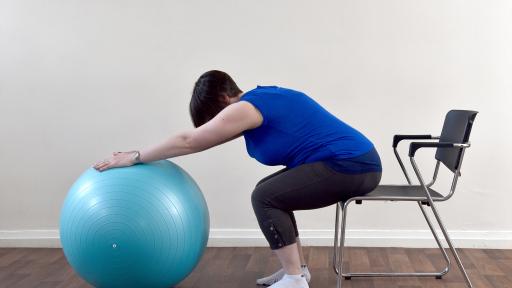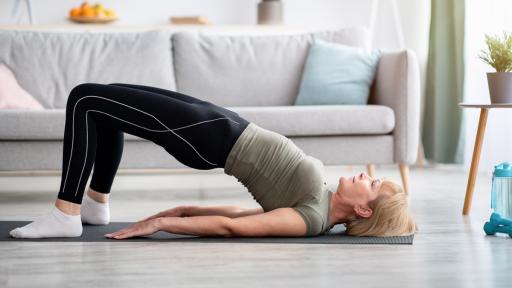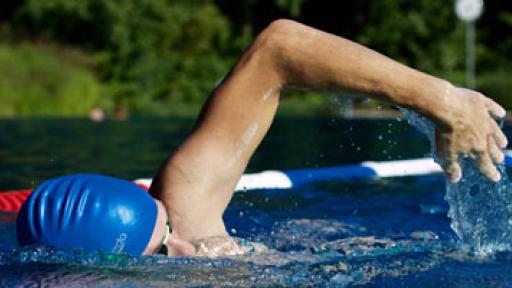Pilates is a low-impact exercise which focuses on building core stability and muscle strength by performing a range of exercises in a flow of movement. The exercises are based on six fundamental principles: concentration, control, centering, flowing movement, precision and breathing. Pilates can be practised on the floor with a mat or with a range of equipment and apparatus (e.g. weights, resistance bands, an exercise ball or a barre). Pilates is usually taught by a trained instructor in small groups or one-to-one sessions. Many people with MS practise Pilates as a complementary therapy alongside conventional medicine they are taking for their MS.
Research has proven that exercise in general is beneficial for people with MS. It’s important for maintaining health and wellbeing, and can help to alleviate some MS symptoms. Pilates in particular is becoming more popular among people with MS. There is good general evidence of the benefits of Pilates, and there are now a small number of scientific studies which have investigated the potential benefits specifically for people with MS. The majority of these studies were carried out in small groups but their results were promising. The benefits covered a variety of areas – the main ones seen were improvements in balance and mobility, decreased levels of fatigue and pain, and better cognitive function and quality of life.
Pilates is suitable for people of all levels of ability, including people who use wheelchairs. Exercises can be modified by your Pilates teacher to suit you.
Pilates classes are offered at most MS Therapy Centres around the UK. These classes are tailored to meet the needs of people with MS. You can search for your nearest centre using our Map of MS Services.
If there isn’t a centre near you, Pilates classes are usually available at local gyms and fitness centres. You should let the Pilates instructor know that you have MS when you start the class so they can adapt the exercises for you.
Alternatively there are books, videos online and apps if you’d prefer to learn the practice at home. However it’s best to speak to a physiotherapist beforehand so they can advise on exercises that will best suit you and your ability. Your GP or MS nurse can refer you to a physiotherapist in your area.
One 12-week study compared the effects of Pilates and physiotherapy on walking and balance. 45 people with relapsing remitting MS with EDSS scores between 3.0 and 6.0 completed the trial. Participants were given either a Pilates programme or a physiotherapy programme, both involving one 30-minute session per week. Pilates and physiotherapy were found to be equally effective at improving balance and mobility.
Another study of 30 people with MS also examined the effect of Pilates on walking performance. Participants were assigned to either Pilates and massage therapy or massage therapy only. The 6-minute walk test (walking as far as possible in six minutes) was used to monitor whether Pilates was effective or not. Walking distance increased by 52.4 metres in the Pilates group compared to 15 metres in the massage group. The study concluded that Pilates is a viable exercise option to help manage MS.
However a separate study of 100 people with MS found that Pilates only resulted in small improvements in walking and balance. This 12-week study randomly assigned participants to either a Pilates programme, standardized exercises or relaxation. The Pilates group saw minor improvements in walking and balance, but these changes were not great enough to be considered clinically significant (20% improvement is considered clinically significant).
Pilates can also improve cognition, quality of life and physical performance. A study including 20 people with MS with an EDSS score below 6.0 were split between a Pilates group or a traditional exercise group. The Pilates group focused on core strength and breathing exercises. The results of the study showed that Pilates improved balance, performance, fatigue, cognitive problems and quality of life.
Pilates is also effective and feasible for people with MS who use wheelchairs. One study found that it could improve sitting stability and posture, and decrease back and shoulder pain. The people with MS who took part in the study also described psychological and social benefits.
Finally, Pilates has also been evaluated as a potential tool for rehabilitation. The study reviewed a range of papers looking at the benefits of Pilates in a number of conditions, including MS. The review found significant improvements in pain, disability, balance and movement. It concluded that Pilates has demonstrated effectiveness as a rehabilitation tool both for MS and a range of other conditions.


